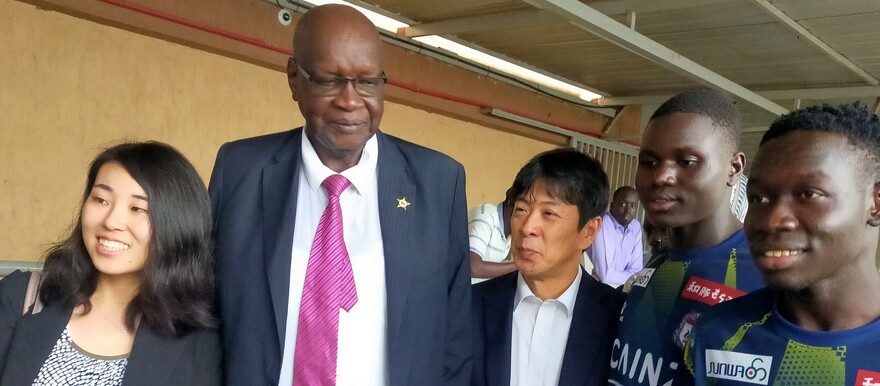Two South Sudanese teenage football stars, Christopher Nyang and Marko Oryue Michael, have returned home after completing six months of professional football training in Japan.
The journey began with their successful participation in the yearly National Unity Day Sports Gala organized by the Japan International Cooperation Agency (JICA), which led them to the Japanese City of Maebashi for intensive training.
Upon their arrival at Juba International Airport on Friday afternoon aboard FlyDubai aircraft, Christopher Nyang expressed his appreciation for the program, emphasizing the valuable experiences gained during their time in Japan.
Nyang stated, “The program was good, and the training was good. We really enjoyed the training and benefited from it. We also interacted with many people, visiting schools and having fun with the students.”
Nyang praised the coaches and the quality of the training facilities, underlining how these experiences will benefit South Sudan’s football development. He called for continued cooperation between the governments of Japan and South Sudan to perpetuate such initiatives.
“I have gained a lot of knowledge from these coaches, and I won’t keep it to myself. As I return home, I will share it with others,” Nyang affirmed. He expressed gratitude to both Japan and South Sudan for their joint efforts to foster football development in South Sudan.
Marko Oryue Michael also shared his excitement after the training in Maebashi City, mentioning how they learned the Japanese language and taught English to their Japanese friends during their six-month stay. He noted the initial challenges of communication but highlighted the significant progress made over time.
Edward Setimo Yugu, Director General of Sports at the Ministry of Youths and Sports, explained that the training of these two young footballers in Japan was part of a memorandum of understanding between the Ministry and Maebashi City. The aim was to provide a six-month course in professional football, offering invaluable experience.
Yugu expressed the Ministry’s pride in the discipline and conduct displayed by the two teenage footballers during their time in Japan. He highlighted the importance of having young athletes who not only excel in their sports but also demonstrate good behaviour and respect for the rules.
“We are proud of them, and they were also pleased with these young athletes. They found them to be humble and polite, which aligns with our expectations for our young players – to compete, respect the rule of law, and build friendships,” he emphasized.
Mina Wantanabe, Head of Cultural Affairs at the Japan Embassy in South Sudan, emphasized Japan’s focus on using sports to promote unity among South Sudanese people from various ethnic backgrounds.
She pointed out that Maebashi City, where Christopher and Marko trained, previously hosted South Sudanese Olympic players and signed an agreement with the Ministry of Youths and Sports to accept South Sudanese sports players for training annually, symbolizing the ongoing collaboration between the two countries.
Wantanabe believes that this program marks the beginning of more grassroots exchanges between Japan and South Sudan, fostering greater cooperation and cultural exchange between the two nations.




